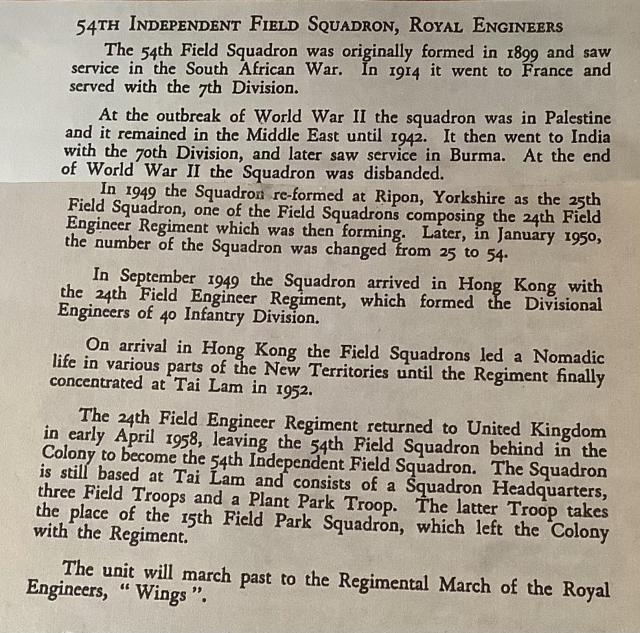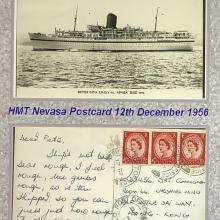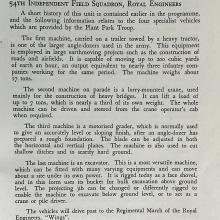This article may be of interest to past members of Royal Engineers who I note are active on this forum This short history of the squadron is from the 1958 programme of - The Queens Birthday Parade - Hong Hong - that took place on Monday 21st April when the squadron was part of Army Marching Contingent . and also the Mechanised Column.
54th Independent Field Squadron Royal Engineers- short history

Submitted by Bryan Panter
Date picture taken (may be approximate):
Monday, April 21, 1958
Gallery:
Connections:
- 54th Independent Field Squadron Royal Engineers- short history shows Organisation 54 Squadron, Royal Engineers [????-????]




Comments
54TH Independent Field Squadron, Royal Engineers
Text copy:
The 54th Field Squadron was originally formed in 1899 and saw service in the South African War. In 1914 it went to France and served with the 7th Division.
At the outbreak of World War II the squadron was in Palestine and it remained in the Middle East until 1942. It then went to India with the 70th Division, and later saw service in Burma. At the end of World War II the Squadron was disbanded.
In 1949 the Squadron re-formed at Ripon, Yorkshire as the 25th Field Squadron, one of the Field Squadrons composing the 24th Field Engineer Regiment which was then forming. Later, in January 1950, the number of the Squadron was changed from 25 to 54.
In September 1949 the Squadron arrived in Hong Kong with the 24th Field Engineer Regiment, which formed the Divisional Engineers of 40 Infantry Division.
On arrival in Hong Kong the Field Squadrons led a Nomadic life in various parts of the New Territories until the Regiment finally concentrated at Tai Lam in 1952.
The 24th Field Engineer Regiment returned to United Kingdom in early April 1958, leaving the 54th Field Squadron behind in the Colony to become the 54th Independent Field Squadron. The Squadron is still based at Tai Lam and consists of a Squadron Headquarters, three Field Troops and a Plant Park Troop. The latter Troop takes the place of the 15th Field Park Squadron, which left the Colony with the Regiment.
The unit will march past to the Regimental March of the Royal Engineers, " Wings ”,